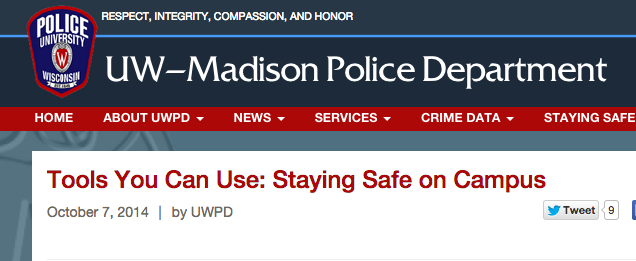Last week, a Jezebel writer brought campus’ attention to a blog post by the University of Wisconsin Police Department called “Shedding the Victim Persona: Staying Safe on Campus.”
The crime prevention post, which included mostly helpful safety tips like “don’t travel alone” and “drink responsibly,” was swiftly criticized by many on Twitter for its careless use of insensitive victim-blaming language.
UWPD blog post faces criticism for ‘victim blaming’ language
This included cringe-worthy phrases like “A victim looks like a victim!” and “If you present yourself as easy prey, expect to attract some wolves.” It also said that while “none of us are immune to the possibility of becoming a victim,”— which is unfortunately all too true — we can avoid being victims by simply having an “I won’t let it happen to me!” attitude. If only more people could adopt such a casual and cheery outlook!
The piece was quickly edited with an apology and revisions, including the removal of “Shedding the Victim Persona” in the title to be replaced with “Tools You Can Use.” Most of the blatant victim-blaming nuggets that originally peppered the article were removed, although the crassly flippant “I won’t let it happen to me!” still brings the post to a slightly off-putting close.
While I applaud the speedy execution of the editor’s note, it’s still important to recognize the problematic nature of the original language used. Victim-blaming — as it relates to any crime, including sexual assault, is unacceptable. It’s also most definitely not expected from our university police, who I’m confident have all of our best interests in mind and only want to keep students safe.
Although the editor’s note emphasized the original post was intended to be about general crime and said many took the article out of context, it’s hard not to construe the post to at least in part refer to sexual assault. Sexual assault is, in fact, a crime — and it’s a common one: about 20 percent of college women are sexually assaulted while in school. It seems ridiculous that UWPD wouldn’t have realized how the post could be interpreted, especially given the prevalence of sexual assault and the national discourse that’s been sparked as campuses including ours grapple with how to best address the issue.
Language is powerful. The way we frame and talk about sexual assault is important to discuss and consider carefully. Suggesting there is a “persona” of any victim is both absurd and offensive. It also is gendered, as an estimated 90 percent of sexual assault victims are female. Perhaps all women should don mustaches and disguise themselves as men when they go out to proactively shed that aspect of their “persona” which attracts “wolves.” Language like that used in UWPD’s post is precisely what contributes to a climate in which rape culture and slut-shaming persist and women are told they are “asking for it” if they wear a skirt too short or neckline too low.
As is pointed out in the editor’s note, nobody ever deserves to be a victim of any crime, including sexual assault. The use of victim-blaming language can discourage people from reporting incidents or getting help for fear of being held accountable or shamed. Estimates for the percentage of sexual assaults that go unreported range from 60 to 80 percent. These numbers are both alarming, and institutions of power should promote a culture in which victims feel safe asking for help and reporting incidents to law enforcement.
With so much focus on a so-called “victim persona,” where is the discourse on what creates a “perpetrator persona”? Placing all of the weight on students to be a “hard target” is misguided and ineffective. We often hear the words “don’t be a victim” more so than “don’t sexually assault people.” While UWPD clarified that the post was not intended to relate to sexual assault, why wouldn’t it be? Sexual assault — including stranger sexual assault — is a pressing issue that can’t be talked about enough.
If anything positive comes out of this mishap, it’s that UWPD has learned a bit about how to better frame crime prevention discourse. This all also serves as a reminder of the many great resources available on campus, including UHS services, the county’s Rape Crisis Center, EVOC and services like SAFEwalk.
UWPD’s post was irresponsible, poorly thought out and could have been triggering for victims and survivors of sexual assault and rape. Telling someone that they will “attract wolves” is not only unhelpful, but places burdens on the wrong people. Yes, there are things we can all do to be safer, but in some cases, as UWPD even points out, nobody is immune to the possibility of becoming a victim. Campus institutions do a great job of keeping UW students safe and promoting our well-being. But, nobody should ever be told they “look like a victim” or that they can “expect” to be one. We do, however, expect more from UWPD.
Katie Caron ([email protected]) is a senior majoring in journalism with a certificate in environmental studies.





















